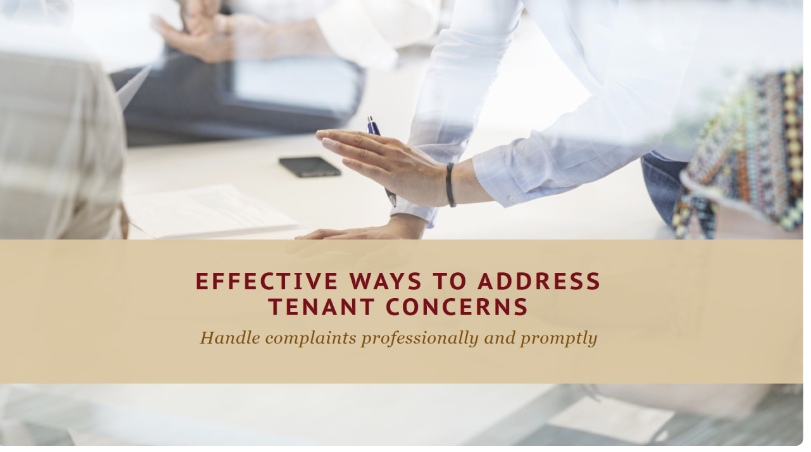
Dealing with tenant complaints is a crucial aspect of property management. Handling these concerns promptly and professionally can enhance tenant satisfaction and maintain a harmonious living environment. Here are some strategies to manage tenant complaints effectively, supported by insights from AI and the LinkedIn community.
When a tenant raises a complaint, the first step is to listen actively. Give them your full attention and strive to understand the specifics of their issue. This not only demonstrates respect but also helps you gather the necessary information to address the problem effectively. Acknowledge their feelings and reassure them that their concerns are important to you. Tenants who feel heard are more likely to cooperate during the resolution process.
Once you understand the tenant’s complaint, assess how urgent the issue is. Determine whether it requires immediate attention or if it can be scheduled for a later time. Prioritizing complaints based on their severity ensures that critical issues are addressed promptly, preventing minor problems from escalating into major ones. This step is essential in maintaining a safe and comfortable environment for all tenants.
Clear communication is essential in managing tenant expectations and avoiding misunderstandings. Inform your tenant about the steps you will take to resolve their complaint and provide realistic timelines. If delays occur, update them promptly. This transparency builds trust and demonstrates that you are taking their concerns seriously. Effective communication can often defuse potential conflicts and lead to quicker resolutions.
Taking action is where your problem-solving skills come into play. Depending on the nature of the complaint, this might involve coordinating with maintenance staff, mediating disputes between tenants, or reviewing lease agreements. Act decisively and follow through with the solutions you’ve proposed. Documenting the actions taken helps in tracking the resolution process and provides a reference for any future issues that may arise.
After the complaint has been addressed, follow up with the tenant to ensure they are satisfied with the outcome. This step is often overlooked but is vital for building lasting relationships with your tenants. A follow-up shows that you care about their well-being even after the issue has been resolved. It also provides an opportunity to receive feedback, which can help improve your property management practices.
Maintaining detailed records of all tenant complaints and the actions taken to resolve them is crucial for effective property management. These records can help identify recurring issues, indicating a need for long-term solutions. They also serve as documentation in case of disputes or legal matters. Keeping organized and accessible records shows professionalism and can significantly streamline the complaint resolution process.
Prevention is often better than cure. Implement measures to prevent common complaints from arising in the first place. Regular maintenance checks, clear communication of house rules, and tenant education on property care can reduce the number of complaints you receive. Address potential issues before they become problems to maintain tenant satisfaction and property standards.
In certain cases, professional help may be necessary. This could include hiring a mediator for tenant disputes, engaging legal counsel for complex issues, or consulting with property management experts. Seeking professional assistance can provide you with the expertise needed to resolve complicated complaints efficiently and legally.
Creating a positive community environment can minimize tenant complaints. Organize community-building activities, encourage neighborly behavior, and create open channels for feedback. A strong sense of community can lead to better communication among tenants and a more cooperative atmosphere, reducing the likelihood of complaints.
Regularly reviewing and updating your property management policies can ensure they remain effective and fair. Gather feedback from tenants and adjust policies as needed to reflect their concerns and the evolving nature of property management. Transparent and updated policies help in managing expectations and reducing conflicts.
Ensure that your property management team is well-trained in handling tenant complaints. Provide training sessions on active listening, effective communication, and conflict resolution. A knowledgeable and empathetic team can manage complaints more effectively, leading to higher tenant satisfaction and smoother operations.
Leverage technology to streamline the complaint management process. Use property management software to track complaints, schedule maintenance, and communicate with tenants. Technology can enhance efficiency, ensure timely responses, and provide a clear record of all interactions.
If you are looking to optimize your property management services with ConnectX, contact us at info@connectx.live
Map
Email Us
info@connectxservices.com
Call Us
UK Office Address: 71-75, Shelton Street, London, England, WC2H 9JQ
UAE Office Address: Meydan Grandstand, 6th floor, Meydan Road, Nad Al Sheba, Dubai
©2024 ConnectX Services. All Rights Reserved.
Terms and Conditions
Privacy Policy

Subscribe to our below newsletter and never miss any update